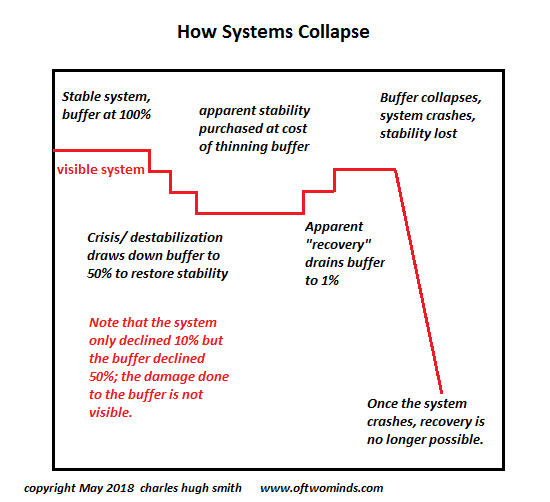Sclerotic, hidebound institutions optimized for linear stability and permanent growth are simply not designed to adapt to non-linear change and disruption of permanent growth.
Since the first news of pandemic in late January, I've been discussing potential accelerants to the unraveling of our fragile financial system: second-order effects (initial travel restrictions and layoffs were first-order effects, new waves of layoffs are second-order effects) and the shift from linear dynamics (add 1 to inputs, that changes output by 1) to non-linear: (add 1 to inputs, that changes output by 10).
The system appears stable until a catalyst pushes it off the cliff. Catalysts come in a variety of forms, from the apparently modest "straw that breaks the came's back" to a broad awakening that the status quo simply isn't capable of adapting successfully to new realities.
Financial catalysts tend to result in sudden, cataclysmic collapses in liquidity, solvency and sentiment. While the Federal Reserve can "fix" liquidity crises by creating currency out of thin air, that doesn't make bankrupt firms solvent or make employers hire employees. Once complacent confidence slides into cautious fear, massive liquidity injections to keep the system from crashing are understood as last-ditch desperation.
Social-political catalysts are slower but much more difficult to reverse. While the media's attention has been focused on the protests stemming from long-standing institutional bias, As Mark, Jesse and I discuss in Salon #14: Jobageddon and the Coming Education Revolts, two other social-political catalysts are gathering momentum:
1. The failure of our education complex to provide workable childcare/learning solutions
2. The hope of a V-shaped recovery in employment collapses.
As I mention in the podcast, there is a class dynamic in these potential catalysts that few mainstream pundits follow to the logical conclusion. When socio-economic distress is limited to the politically powerless working class--for example, the blatant exploitation of gig-economy and contract workers--the power structure can safely ignore the brewing crisis because the distressed workforce has insufficient economic-political power to threaten the rule of the Power Elites.
But when the top 20% of the workforce that accounts for 50% of all consumer spending and 80% of the citizenry's political voice is in distress, the Power Elites better pay attention. Nobody in power really cared if lower-income households struggled with juggling childcare and getting to work; but when Mr. and Ms. Technocrat are struggling, suddenly it's an issue that can't be ignored.
The same dynamic is also in play in the 21% unemployment that's accelerating to 25% unemployment. As long as it was the marginal workforce that was losing jobs, the power structure reckoned unemployment was a solution.
But as the second-order effects gain momentum, middle-class jobs will start vanishing and unemployment won't be enough to pay bloated mortgage payments, property tax bills, etc., and the defaults of student loans, credit cards, auto loans and mortgages will start piling up.
As people awaken to the fact that the V-shaped recovery was a fantasy, sentiment will slide from confidence to angst. The failure of institutions to adapt to new realities will be impossible to deny, and the choices may boil down to opting out (i.e. assemble informal groups of households that pool resources to hire a private tutor for home-schooling their children) to organized revolt (i.e. teachers' union strikes).
Sclerotic, hidebound institutions optimized for linear stability and permanent growth are simply not designed to adapt to non-linear change and disruption of permanent growth. Systems stripped of buffers are fragile, systems stripped of feedback are fragile, systems that optimize doing more of what's failed spectacularly are fragile, systems that are little more than fractals of incompetence are fragile, systems that rely on the artifice of denial and fantasy are fragile.
Fragile systems break. This is why the unraveling is accelerating.

Recent Podcasts:
Audiobook edition now available:
Will You Be Richer or Poorer?: Profit, Power, and AI in a Traumatized World ($13)
(Kindle $6.95, print $11.95) Read the first section for free (PDF).
Will You Be Richer or Poorer?: Profit, Power, and AI in a Traumatized World ($13)
(Kindle $6.95, print $11.95) Read the first section for free (PDF).
Pathfinding our Destiny: Preventing the Final Fall of Our Democratic Republic ($6.95 (Kindle), $12 (print), $13.08 ( audiobook): Read the first section for free (PDF).
The Adventures of the Consulting Philosopher: The Disappearance of Drake $1.29 (Kindle), $8.95 (print); read the first chapters for free (PDF)
Money and Work Unchained $6.95 (Kindle), $15 (print) Read the first section for free (PDF).
If you found value in this content, please join me in seeking solutions by becoming a $1/month patron of my work via patreon.com.
If you found value in this content, please join me in seeking solutions by becoming a $1/month patron of my work via patreon.com.
NOTE: Contributions/subscriptions are acknowledged in the order received. Your name and email remain confidential and will not be given to any other individual, company or agency.
Thank you, Alan H. ($5/month), for your marvelously generous pledge to this site -- I am greatly honored by your support and readership. | Thank you, Eric A. ($5/month), for your splendidly generous pledge to this site -- I am greatly honored by your support and readership. |
